#introverted intuitive
Explore tagged Tumblr posts
Text
Os Iusti
A Playlist About Ni as a Dominant Function.
This is an unapologetical ramble that will be soon followed by a lot of even verbos-er rambles. Give the Playlist a listen if you found this somehow interesting.
A disembodied hand carrying a key is the perfect metaphor for Introverted iNtuition (Ni): the key itself represents the unfathomable knowing, but the unseen door leaves us questioning what is it that can be opened, known. What lies beyond is veiled, both to others and to the Ni-Fe themselves, until the moment of revelation. This playlist mirrors the labyrinthine and multi-dimensional nature of the Ni dominated psyche, mapping a journey that is simultaneously personal and universal.

Os Iusti, meaning “The Mouth of the Just,” speaks to Ni’s relationship with revelation. Though silent and elusive, when Ni does speak, it unveils profound truths that resonate on a mythic and symbolic level. It won't necessarily be well translated to others, though, and here arises a Cassandrian problem for the Ni-dom. This function often “sees it all coming” long before others catch up, only to be dismissed until hindsight vindicates it. How well developed the J-functions of the user are will determine how much they get out of the alluring mind palace of Ni.
We can see in Jung's Psychological Types (1921):
Inner objects appear to the intuitive perception as subjective images of things, which, though not met with in external experience, really determine the contents of the unconscious, i.e. the collective unconscious, in the last resort. Naturally, in their per se character, these contents are, not accessible to experience, a quality which they have in common with the outer object. For just as outer objects correspond only relatively with our perceptions of them, so the phenomenal forms of the inner object are also relative; products of their (to us) inaccessible essence and of the peculiar nature of the intuitive function.
that Ni is untranslatable; the things a Ni-Dom user experiences as their normal cognitive process is composed mainly by images, impressions, vague certainties. These types are very specific kind of people: I see online a tendency to broaden what it means to be Ni-Dom, but Jung is clear with it: introverted perception is aloof and loony and guides itself with impressions of the body and the imagery of absolutes. This is what is so fascinating about introverted perception functions: they deal with probability, yes, but the user experiments those probabilities as absolutes. The user will rarely focus on "all the possibilities" but on The One Possibility their powerful perception marks. We can understand the Pi functions as internal maps: one based on impressions of the body and the other, "of the soul". "The Soul" here means the archetypes of the universe. The Sun, The Warrior, The Emperor... They all masquerade as situations rise and fall over time in a never-ending cycle. A repetition. An eternal return. All closely guarded by the collective unconscious. For the introverted intuitive, the world is a constant flux of cycles that repeat themselves and can be gazed at. At least partially. As images. As impressions.
You see, the experience is as puzzling for the user as it is for our inner circle: as exhilarating as my certainties can be for me, I don't really know where they came from or what exactly do they mean. A "vibe" I get from someone can assume the form of a vivid image of them kicking someone in the balls for fun while smoking a joint. Or something less explicit: I can feel they are terrible violent people by the way they smiled. Why? Hell knows. I can just feel snakes crawling up my arms when they smile. What does that even mean? I will give you a delicate shrug. You do you, my gut told me. I trust it with my bones.
Finally, and we will follow with the songs and why they're there I promise, we need to understand something about Ni: it is narrative in nature. The impressions it deals with are composed mostly by images that serve a deeper, much bigger focal point.
Thinking on images means an acute sense of aesthetics too, of the aesthetic nature of patterns: perception means contemplation and passivity, not capable of judgement. It reminds us of The Crone, the ancient chaman who knows the secrets of the stars. Ni deals with equilibrium and divinity and the impressions evolution and society have made us grasp with the strength of a baby in need. Ni sees the egg and the snake that coils under the earth. Necessarily, a Ni-dom gets their impressions from images, because the introverted intuition deals with the disembodied triggers a sensation can awake.
Or, as Jung would eloquently put it:
Intuition receives from the sensation only the impetus to immediate activity; it peers behind the scenes, quickly perceiving the inner image that gave rise to the specific phenomenon (…) It sees the image of a tottering man pierced through the heart by an arrow. This image fascinates the intuitive activity; it is arrested by it, and seeks to explore every detail of it.
Without further ado, the songs:
Hide - CS01 version — Dorian Concept
whispers in motion
This track is about how Ni feels. It's disorienting and elusive. It's also full of patterns. Here, it's mean to speak about the layers of abstraction behind Ni-images. This function only perceives sensorial information to generate images.
I once told a friend Ni feels like structures building themselves. Without my knowledge, action or conscious effort insights sharpen into crystalline clarity only to fragment under their own weight. Some of them don't, but I have no compromise with them. They're product of the wild energy of being a flesh machine. I judge their beauty, their soundness, their structure. And I won't ever find a way out.
The disjointed rhythms evoke this. In this moment, I become an observer, piecing together fragments of a vast structure underneath. Constantly moving from one filament to another, piecing into an unconscious web of... Something. Introverted intuition feels constantly as something that occurs outside of me, like a spider would inevitably create a web. This is a joy and a pain in the ass.
A Dark Cloud is Coming — Moby
an apocalyptic vision
This one is slow and paced and builds up to an intense ending. It's a little over the nose, isn't it? Well, the gift of prophecy can only be understood as a dangerous delusion: it bears an indistinct sense of impending doom that grows clearer with time. Yes, of course the impressions are useful. I have already stated how much I trust them... But it still gets itself into visions of doom. It feels like a constant weight on the shoulders, real or not. In a lecture, Jung (1938), speaks of a persona gifted with a second vision. Her delusions are not "of neurotic origin" and so she's not considered mentally ill. These visions, however, give her a "strong personal dissatisfaction"; she was absolutely terrified by sensations that were not entirely real and were not entirely hers.
This also delves into the very annoying, very real apocalyptic visions Ni can give the user. When under stress, they can be realistic and feel like accurate depictions of what will become reality. Here, the absolutes Pi deals with become a double-edged sword: if your always trusted perception tell you there is something off going on in the world... Will you ignore it? Exactly.
In this Album, Moby channels his reflections on contemporary life and personal torment into jagged post-punk. However, this time they emerge wrapped in a deceptive gentleness—like the smothering embrace of a down pillow, soft and suffocating all at once. This is an album about his fear of the species future. His eclectic style and the beautiful lullaby this song is felt just right.
If I Were — Vashty Bunyan
mammals yearn
My story with this song is from long ago. The first time I listened to it my hairs went up and it felt like I had discovered something of ultimate importance. I yearned. I yearned painfully and I did so because of the images in my head. The feelings they gave me. I became aware of my gut-wrenching, existentially itchy habit of contemplating (sometimes believing in) alternative realities.
Not as mere fantasy, but as something that illuminate the present and they do so because we are plagued by impressions of our past. We have developed a collective, evolutionary, memory that makes us enjoy and be terrified of basically the same things. Bunyan’s lilting voice and bittersweet lyrics imagine a world shaped by care and gentle longing. Ni yearns to align the external world with its internal tapestry of symbols. Whatever these images are, they're much more beautiful than wherever the Ni-dom is currently dwelling. Beauty, as stated before, is a main driver for the psyche of introverted intuiters.
Ni doesn’t just seek beauty; it obsesses over it, hunts it down, and then mourns its impermanence. It creates these beautiful, impossible ideals, then leaves you stuck in a world that can’t match them.
Jung, has something insightful to say about this, actually:
it is an aesthetic problem, a question of perception, a 'sensation'. In this way, the consciousness of his own bodily existence fades from the introverted intuitive's view, as does its effect upon others. The extraverted standpoint would say of him: 'Reality has no existence for him; he gives himself up to fruitless phantasies'
I rest my case.
Forest Nativity - Francis Bebey
this tropical ape
This song is about something I mentioned before. Ni sees the snake. Why the snake? Well, as a symbol it is connected to the earth, to clay, to water, to flexibility and longevity. The snakes are one of the most ancient evolutionary enemies of primates. It also symbolizes lost of control, danger and chaos.
We fear them with such uniformity that out brain is wired to recognize snakes in less than a second (2016). What I'm saying here is our ecosystem has influenced the way our brains react and think collectively: if we all come from the same savannah, then we have the same primal fears. The same, old, tropical fears. I, personally, think archetypes primarily arise from there. From terror.
This track is about intricate rhythms connected to instinct. Here, I only want to remind you, and me, that Ni is a function born of instinct. Of music and religion as catalysts of society. No matter what we perceive, our feet are touching the jungle's soil, always —it’s that gut feeling of “there’s something off,” the perception that always feels just outside of reality, dancing on the edge of the conscious.
This constitutes, then, a liminal zone for the psyche: trapped among excel sheets and the animal impulse, broker of ties and marriages and skin boots. Ni thrives in these liminal zones. In the in-betweens. It weaves meaning from the interplay of this forest nativity. Ni fleshes out these collective memories through narratives and images, constantly exploring this... And for a Ni-Fe, that also means the human drama.
Olsen Olsen - Sigur Rós
trascending as a sweet
Sigur Rós is a band of icelandic Post-rock. Yes, cope. Their music is ethereal, and made to be beautiful: their creative process follows first the sound and then the meaning of each track. That is a familiar feeling. Stephen King, a famous Ni-Te, describes its creative process as unplanned: he just follows his internal map. What works. What can be envisioned as beautiful. Whatever beautiful means in a given situation.
Like Ni creative process, this song goes away from mundane concerns and toward the sublime. With its otherworldly vocals and expansive melodies, It is firstly concerned with creating sensations and crafting an image. The song was written in an invented language specifically for it, one that will be revisited by the band in future songs, but is just crafted to sound beautifully.
Few tracks embody both Ni tendency to transcendence in the sublime and the irony of its prison of flesh. The ending of the song, after a long descent into imagination and memories, a childhood sweet or a card game, crashes us with the familiar low roar of a supermarket.
Buzzcut Season - Lorde
detached awareness of impermanence
I will be honest, Lorde was not my favorite during most of my life, until her EP in maori came out. I had had my head up my ass all this time about an amazing artist. Buzzcut Season was a serendipity: and in this case it talks very openly to me about the inevitable detachment I feel for the world. And about how it feels to grow up when you don't think it has any meaning. About ignoring and fantasizing.
Something I already mentioned comes to play here, a weaving of opposites. I perceive collective dissonance and their inner tension between empathy and cynicism. I am weighted down by the impossibility of eternity. Lorde's detached delivery contrasts with the emotional gravity beneath the lyrics. I knew when my childhood ended with painful clarity, and I remember the details of my particular tragedies with detail. I still struggle to find myself outside of my head.
Now, this detachment is not in an emotional sense exactly. It's of a different nature. It's more of a hyper-involvement in a symbolic layer that renders the mundane world irrelevant.
This song is about Ni's tendency to detach from the present, observing it as though from a distance. Recognizing the impermanence of everything that has ever existed and the underlying patterns that shape them, yet unable to scream in horror. The Ni-dom is at deep emotional resonance with the world’s beauty, tempered by an almost clinical awareness of its fragility.
Illusion of Seclusion - Photay
I am one, or all, or nothing
I might sound like some kind of purist here, quoting fucking Jung and all, but I do think there is value in whatever insights and further readings into typology new blood has to give. The people from Cognitive Type, for example, have very interesting takes on Ni. Its creator explains that Ni's perception is translocal: meaning all information gathered, processed and burped out as an automatic castle will be working in function of an axiom.
This is why Ni can feel so disjointed from the “now”—because it’s not just analyzing the present, it’s tying it to an entire temporal and spatial continuum.
It will always have a direction, a focus, it will follow a specific narrative. While introverted sensation knows the facts in a sort of bulleted manner, introverted intuition inevitably arranges the facts as if they were part of a thematic web. Ni has, intrinsically, a direction. A focalized pull. Even the smallest data sets of the pathway must conduct towards the completion of the spider-web.
The previous gives birth to another characteristic of the Ni-dom, a certain idea of panpsychism and synchronicity. The psyche of Ni dominated people tends to think of the world as one. Or everything. Or nothing. But all of it for sure. It’s that nagging sense that every event, every detail, even the most mundane moment, serves a larger function in the grand scheme.
Beneath it´s solitary exterior, Ni is constantly weaving connections, weaving a web of meaning that reveals the unity behind apparent separations. For Ni, sometimes, all of the mental and physical objects are but buttons and shafts being pulled by the same forces since the beginning. Solitude is, then, an impossibility.
Os Iusti, WAB 30 — Anton Bruckner
divinity in beauty
This piece is the spiritual core of this playlist. I had the idea while giving this a listening. But first, Os Iusti comes from a bigger quote. It's from the bible, Psalms 34:30, and reads as follows:
The mouth of the righteous utters wisdom, and his tongue speaks what is just.
So this song is about prophecy and truth. Allow me to get a bit mystical with my creative depiction of how it feels to inhabit Ni. To keep it short: beauty is divinity. Transcendence and divinity are but tied to the same log and they flail against the absurd with savage strength. Ni doesn't exactly believe in the teleological nature of the universe, but it certainly acts based on this idea of repetition and symmetry. Bruckner's beautiful chorals address this with the grandeur it deserves, from a higher dimension.
But, it's also related to another dimension of divinity. This playlist, you might have noticed, is not only about condensing Ni, but condensing Ni as the dominant function of an INFJ. This choral piece also resonates with Fe’s moral blade. Its liturgical. It evokes my inner cathedral, where I constantly voice my questions of justice, duty, and alignment.
Although the Pi type is inward-turning in nature, this function:
has little inclination to make a moral problem of perception, since a strengthening of the judging functions is required fo this, only a slight differentiation of judgment is sufficient to shift intuitive perception from the purely aesthetic into the moral sphere (...) only a slight differentiation of judgment is sufficient to shift intuitive perception from the purely aesthetic into the moral sphere
and that:
It is different with the morally oriented intuitive. He reflects on the meaning of his vision, and is less concerned with developing its aesthetic possibilities than with the moral effects which emerge from its intrinsic significance
Yes, Ni is meditative and silent and won't necessarily make a fuss out of it. But just you wait. “Os Iusti” speaks not of human justice, but of cosmic harmony.
We Have a Map of the Piano - Múm
and the piano is everything
This one is more of a metaphor. The piano is... Well, everything. We are the pianos and our human drama is the piano too. Ni, sometimes, feels like having an internal map for everything that has happened under the sun. An hermetic, deeply confusing map. More often than not, the map of the piano will be much more important than the piano itself. The image will impose over reality and instead of grasping the deeper truth, I'll be chasing my own shadow.
In these archetypes, therefore, all experiences are represented which have happened on this planet since primeval times. The more frequent and the more intense they were, the more clearly focused they become in the archetype. The archetype would thus be, to borrow from Kant, the noumenon of the image which intuition perceives and, in perceiving, creates.
The map is, however, fucking alive. Do you know what cell membranes are made of? Oil and coloidal substances suspended in water: meaning, their very own structure is a fluid mosaic. Always changing, always different. The map is the same.
The collective unconscious doesn't work for the Ni-dom, we just glimpse at it with uncanny precision sometimes. Still its prisoners tho. Remember what I said about a map of absolutes, at the beginning? I am talking about one of its downsides: what happens when we fix in the wrong absolute? I will tell you what happens: nihilism and despair.
This song is about the use of the internal map to move around. The crystalline structures my mind creates without agency may not be entire useful, but they provide me with an unshakable sense of direction.
Soul Alphabet - Colleen
on the interpretation of shadows
If the former song was about the maps of everything, this one is specific to us Ni-Fe's. The map here turns on how we process emotions, how we process the world of people, the social economy. It's a soul alphabet because, yeah sure, we will read an entire room and pick out the weirdos, the nice, the disgusting and the arseholes in less than 15 minutes... But, then? Knowing and perceiving are absolutely nothing without their corresponding real object being affected.
A soul Alphabet means to know the exact words needed to open a door... Or it should, if the alphabet was not composed of archetypes and their implications. Yes, yes, they're useful, but seeing my boss as "The Emperor" and predicting his behaviour based on it can only take me so far.
You might have caught the problem a few songs back. Ni gives a lot on how to navigate relationships, but it also picks you apart. The belief that you already know what will happen is, very often, an obstacle to feel involved with your loved ones. With the world. And to accurately understand what is already going.
What happens when the image of the object is as heavy in your psyche as the object itself? Which one is more beautiful? Whom did I say had a fixation with beauty? Starting to get it? It, introverted intuition,
perceives all the background processes of consciousness with almost the same distinctness as extraverted sensation registers external objects. For intuition, therefore, unconscious images acquire the dignity of things (Jung, 1921)
As I have tried to convey during this entire verborrhea: Introverted intuition is both a joy AND A PAIN IN THE ASS. More often than not I will feel utterly overwhelmed by the information I'm perceiving (shadow Se much?) and will need time to understand what, in the first place, this all means for me. Yeah, sure, I know Frederick's got a crush in this german girl because of the way he looks at her. Because I get his butterflies while he smiles. I won't necessarily care, since it's an aesthetic problem first, until I have had time to judge... And it will take a while.
It's a beautiful song, tho. Having a soul alphabet in perpetual growth IS beautiful. I find human emotions so utterly beautiful in their primal savagery, and yet, I will feel removed from them. Alienated.
I know the end - Phoebe Bridgers
do you?
Yes, of course I already saw it coming. Do I care enough? Do I want to experience it anyway? The paradox of anticipating the inevitable while wrestling with an unspoken melancholy. This is one of the many dilemmas I��ve hinted at throughout this. From here on, I’m peeling back more of the darker layers of Ni.
What does it mean to know the end? Well, for the Ni user it implies both the constant sensation that the world can't really be a surprise, and an unspoken melancholy. However, do I really, really know the end? No, I don't. Ni isn’t omniscient—it’s a trickster. It feeds you archetypes and calls them truths, maps that blur the contours of reality. This song is both about sadness and stubbornness.
I've already said Ni takes archetypes too seriously. It takes its images as real objects and not machinations of the unconscious. What if the perceived end is one of these delusions? What if it's an apocalyptic vision breed by stress and insecurities? Ni craves the grand design but struggles with nuance. It clings to archetypes—its own self-made gods. Despair isn’t in not knowing. It’s in thinking you do, it’s being so sure you’re right that you refuse to look at the details.
Just like before, the illusion of knowing is a constant danger for these types. Bridgers captures this tension. The song’s crescendo mirrors this: a widening lens that swallows the world in its entirety—hopes, fears, and all—before collapsing into the emptiness of knowing.
You see, the thing is the map will definitely loose sight of the trees.
God, turn me into a flower - Weyes Blood
aren't magnolias pretty?
Ni doesn’t scream. It doesn’t need to. Ni is forceful in its own way. It demands attention—not through volume, but through gravity. This song is about surrendering to that gravity—a dissolution of self into something purer, quieter, beyond language.
“God, turn me into a flower.” A delicate, fleeting bloom, enduring for as long as it’s meant to. Let me be found by those whom are looking for the same divinity as me. Are we not flowers already, tho? Yes, God, tune me out the horror of reality.
But this isn’t a prayer for peace. It’s also a cautionary tale. The myth of Narcissus looms large here, twisted through the lens of modernity. In an age of reflections—be they digital or mental—we often mistake the image for the thing itself. As Weyes Blood laments:
You see the reflection and you want it more than the truth You yearn to be that dream you could never get to 'Cause the person on the other side has always just been you
Ni’s greatest strength is its ability to craft those reflections—shimmering visions of what could be. But therein lies its deepest flaw: the tendency to elevate these constructs above reality, turning them into prisons. We, like Narcissus, chase the reflections we’ve gazed at: the archetypes, the futures, the images of ourselves we wish were real.
What Weyes Blood offers is a counterweight. A call to soften. To stop chasing reflections and instead bloom where we are. Flowers don’t pursue their own beauty; they simply are. Maybe that’s the secret Ni longs to uncover: divinity isn’t in the vision—it’s in the act of blooming.
Suspirium - Tom Yorke
eureka!
It’s not fear, not really. It’s more like standing at the edge of something vast and unknown, staring into it, and wondering, is this mine? Can I claim this abyss? Or does it claim me? It’s a question we’re never ready for, but that’s exactly why it sticks. The light, the heat—it’s all there. But they’re inseparable from the shadow. That’s the thing about Ni, right? We see the whole thing, the light and the dark, and we can’t look away.
Sure. Just keep moving, right? Pretend you’re not aware that you’re stuck in the same dizzying cycle. Keep dancing in the waltz, behind the wall, pretending the laughter and the old songs are enough. Pretend you’re not aching to stop, to sit in the silence and ask yourself, what’s on the other side? The truth is, it’s not the spinning that keeps us going. It’s the hope that when we stop, we’ll still be okay. That we won’t unravel. That we’ll find something whole
Then there’s the final plea: “When I arrive, will you come and find me?” The search for something or someone—answers, resolution, a sense of belonging. But Yorke wraps that in a veil of uncertainty. Will we find each other, or will we just get lost in the crowd? It feels inevitable, and yet entirely unknown. There’s a mother, pulling us back. No tomorrows, no next steps—just a final moment of peace. But is that peace something we’re even allowed to feel?
In a way, it’s a beautiful mess. The waltz, the repetition, the dance between light and dark, the questions we keep asking and never quite answering. Suspirium is a swirl, a cry, a whisper, a pull—a glimpse at something both unknowable and familiar. And maybe that's the whole point.
This song doesn’t just ask you to feel—it asks you to exist. To sit with the weight of being, of moving through cycles you might not even understand, of carrying the light and the dark and everything in between. Ni doesn’t scream, it murmurs, and Suspirium is its hymn. Quiet, unrelenting, heavy with beauty and questions.
Is the darkness ours to take? I don’t know. But I do know that I will have to watch it.
Le Miroir - Alcest
toolkit for indirect knowledge
If Ni was a movie, Alcest would write the whole damn soudntrack. Their shimmering post-rock isn’t just music—it’s a vessel, an immersion into the space where reality blurs and meaning sharpens. Le Miroir is exactly what it claims to be: a mirror, but not the kind you glance into before heading out the door. It’s the kind that shows you and the world. The tool for looking in the corners.
This one is a mirror image in the shadow. Always slightly removed, a step back from reality, gazing at the world itself and at the veiled truths behind it. The shimmer of something more. But here’s the catch: is it a revelation, or just your own shadow staring back? Ni-users know this tension all too well—this need to decode the archetypes, to give form to the formless, to pull the unseen into sharp relief. But at what cost?
“C'est pourquoi je réfléchis.” The clever double meaning: Reflect light, reflect thoughts, reflect existence itself. Mirrors, they reveal, but only indirectly. There’s danger in that constant reflection. You can get lost in it, in the labyrinth of your own interpretations, mistaking the shimmering surface for the depths.
Alcest doesn’t give you answers. It doesn’t hold your hand. It hands you the mirror and asks, “What do you see?”
Je suis une image dans l'ombre un lieu vaguement ébloui (...) c'est pourquoi je réfléchis (...) tout ce qui passe tout ce qui change
Typewriter Lesson - Cornelius
collapse of meaning
Does Ni ever drown in its own depths? Oh, absolutely. Does Ni's ability to see patterns collapse under the weight of over-analysis? It does. If Ni is the all-seeing oracle of the psyche, then Typewriter Lesson is the moment the oracle stares so long into the abyss that it accidentally starts narrating the phone book. This track isn’t just music; it’s a chaotic exercise in over-interpretation.
Let’s get one thing straight: Typewriter Lesson isn’t “about” anything. And yet, that’s precisely why it feels so perfectly Ni. It’s a looping, rhythmic mechanism—clinical yet oddly hypnotic, a melody as sterile as it is strangely evocative. The problem is, Ni can’t leave it alone. It’s like a dog chasing its own tail, hearing the clacking keys and spinning them into grand metaphors: cycles of life! Patterns of communication! The machinery of the human mind!
But then you step back, and what’s left? A glorified typing exercise. Instructions, abbreviations, nonsense syllables. It’s like Cornelius handed you an IKEA manual and said, “Figure it out,” knowing full well you’d end up philosophizing about the meaning of furniture instead of actually assembling it.
And that’s the trap of Ni—this unbearable need to turn everything into a symbol, even when the thing itself is aggressively, stubbornly meaningless. If archetypes are Ni’s favorite playthings, then Typewriter Lesson is the moment it realizes it’s been playing with a piece of Ikea cardboard the whole time.
The beauty, of course, is in the collapse. The sheer absurdity of assigning meaning to something that refuses to hold it. Cornelius serves up a mirror here, reflecting back Ni’s own self-indulgence. You hear the keys, the repetitions, the structured chaos, and you think, Surely, this must mean something.
But does it? Really?
Staircase - Radiohead
tragically trapped
How much control does Ni really have over its webs of meaning? Is it weaving them out of choice, or is it compelled, trapped in a Sisyphean task of interpretation and reinterpretation? Staircase is about the Ni-dominated psyche staring into infinity, endlessly pulling threads, only to realize the whole thing is unraveling faster than it can be spun.
This song is a descent into chaos, into existential horror. Your mind is the delicate spider always spinning it's beautiful web. Non stop. Never-ending. The cyclical rhythm, the disjointed beats—they echo the way Ni perceives patterns in everything, yet never fully pins them down. Each step down this staircase only reveals more steps, more questions, more webs tangled into chaos.
But here’s the twist: if Ni assumes there’s a grand design, why doesn’t it ever reach the architect? Why the hesitation, the half-commitment? Because it, we, know there is no architect. This is also the saving grace; Ni is used to chaos. To nothingness. To provide the structure itself. See, this is my favorite, the collapse, or descent, is but an opportunity. Remember Little Finger?
Chaos is a lader
Radiohead’s layered production mirrors the Ni-user’s internal experience: dense, abstract, and vibrating with tension. The synths and fragmented percussion create a space where agency and inevitability blur. Is the staircase moving you, or are you moving the staircase? The song doesn’t answer—because Ni doesn’t answer. It just keeps spinning.
#personality types#infj#infj personality#infj feelings#Introverted#inuition#Ni#introverted intuition#mbti#Ni dom#symbolism#playlist#themed playlist#xnfj#enfj#mbti playlist#mbti personalities#mbti personality types#jung#carl jung#jungian typology#jungian archetypes#Spotify#my playlist#mbti infj#extraverted feeling#fe#perceptive functions#intuituion#introverted intuitive
6 notes
·
View notes
Text
How the attraction to universal harmony can delay INFJ and INTP blooming

Image credit: https://lovinthings.com/the-creation-of-our-bubble-universe/
For a human, late blooming is the latent realization of their potential. Latent, because although variations are always expected, some still bloom significantly later than average. Average would be during high school or college, and later would be anytime after that, even during retirement.
Any MBTI type can late bloom, it is more due to the environment they grow in, than their type. So any one may, legitimately, relate to the next parts. However, as for anything, some types are more prone than others. I oriented for INFJ and INTP, but probably ISFJ/ISTP, ENFJ/ENTP, and maybe INTJ/INFP would relate to some extent. A theory explaining everything can't predict anything and vice-versa, so here is your always friendly reminder to use MBTI/cognitive functions as a model to infer and predict generalities, not a way to explain the clothes someone wear (although I admit it's fun to do).
I think that, INFJ and INTP, sharing Fe, alongside an introverted attitude and intuitive perception, predestine their childhood into a path to late blooming for any parent that isn't prepared, which is probably all of them.
Out of the 16, they seem the most likely to experience a late blooming due to adaptation contradicting their nature. However I think this adaptation doesn't arise from lack of self-confidence, but from a misdirection in its channeling. Which leads to adapting, and denying themselves, for the sake of the world, without realizing the irony that the world would actually prefer them to not adapt.
Intuition has the tendency to see a theatre rather than a tomato. Whether it is Ni or Ne doesn't matter here; Ni is context independent and will see a theatre in every tomato, Ne relies way more on context, and once will see a theatre, another time ketchup, another time blood, etc. But no matter which process is followed, reality's details are forgotten when weaved together. When assessing any mood, intuition is quick to catch one, but maybe not the most fitting one. If there is a bright sun and light wind, above arms-crossed Jack, an extreme intuitive may easily miss that Jack is actually sad: the arms-crossed information was most likely blurred behind the cozy atmosphere. The "ability to see the big picture" doesn't emerge from intuition, but from its harmonisation with sensation.
In INFJ/INTP, an Introverted attitude is then added to intuition. Introversion is about generalization of the outside world. Introverts see a fruit rather than a tomato. Extroverts read a book rather than its narration. This makes INxx minds prone to universalism, a tendency to see everything related to everything, everywhere, every time. INTJ/INFP also are universalists, albeit most likely of a different kind that I probably wouldn't do any justice describing it.
Then comes the last ingredient: Fe. (Extraverted Feeling, not iron.) For INFJ/INTP, the aforementioned universalism gets oriented by an innate attraction to harmonious systems. If you don't ask them directly, they probably won't tell you that they see in every human, or every living being --or every anything, really-- the individual part of an infinitely complex ecosystem. INFJ loves harmonious systems, INTP loves harmonious systems. When maturing, both come to understand how intricate concepts 'harmony' and 'systems' are, tho, and hence see the other concept exactly as what's missing.
I think it may explain why so many INFJ are drawn to broken human beings, often labelled toxic. It is not that INFJ don't value themselves, but rather that they think in the lines of "If every human being fixes the next one, then we'll reach universal harmony."
I think INTP feel often less compelled to go this route: they often think that someone's problems are their own to fix, not in a uncooperative way, but rather a self-determination one --if you think INTP are individualist, you will be surprised how unconditionally they'll help if genuinely asked.
Back to the point, if the childhood environment didn't encourage the INFJ/INTP to share, and be accepted for, their universalism, the Fe harmony seeking will trap the child into hiding it. Hiding themselves in the process, deeper and deeper inside, until they reach an equilibrium oscillation between two states of mind. One where they believe they shouldn't live as a universalist, because no echoes ever comes back, and another one where they believe everyone else is also a universalist but simply pretend not to be. Both states induce miscommunication. And this oscillation, between two disharmonious states, will erode and consume them as time goes on.
Fortunately, childhood ends at some point, but for our late bloomers, childhood ends after college, or after they leave any equivalent institution offering them a stage to perform. What has changed is that the not-so-prepared adult is now exposed to a lot more situations where they're alone. No more external mood serving as stage directions. However by now, they've spent so much time acting, they struggle to realize it actually *was* acting. From then on, every day is an opportunity for life choices, small and big. Choices which don't affect anyone but themselves, choices which nobody will know about. The past disharmony keeps burning, but isn't fuelled anymore. It slowly fades out, freeing the oxygen, and letting them discover what couldn't burn.
With the fresh air coming in, they gradually wake up from slumber. They realize they were right that *something* was wrong. An even more pleasant surprise: their subconscious didn't play along their acts, it kept building some genuine framework.
They may feel some kind of anger, towards themselves, towards their environment. They may wish to have known sooner. They may a lot of things. But blooming is still blooming. How early or late a flower blooms doesn't matter in its value.
And although the road ahead won't be as foggy anymore, you still have to walk through it to enjoy the journey.
5 notes
·
View notes
Text

INTJ
5 notes
·
View notes
Text

youtube

0 notes
Text
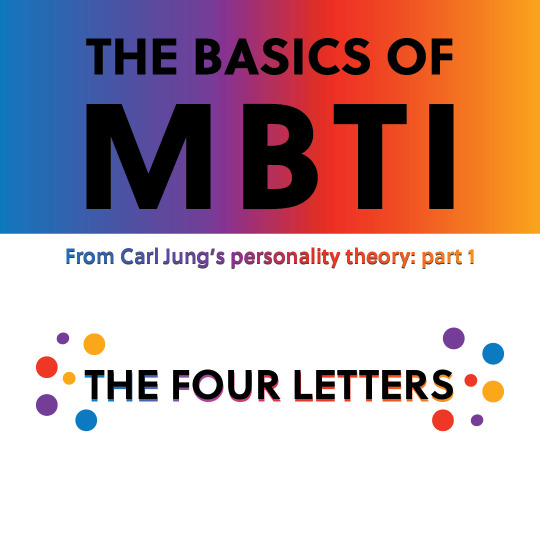

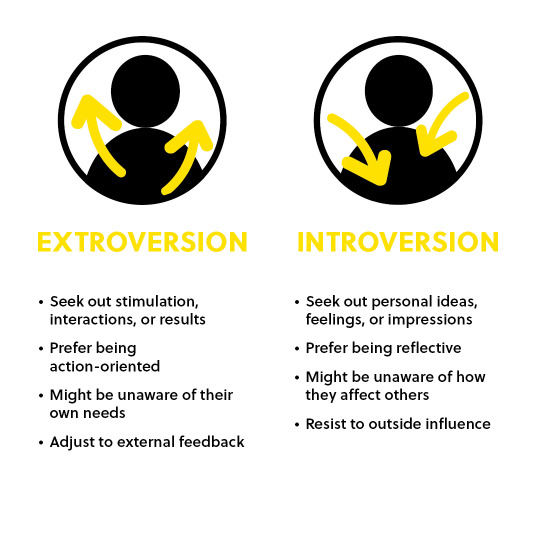




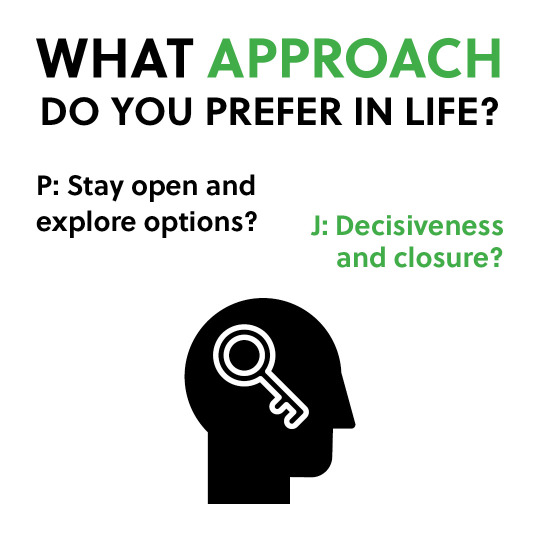



THE BASICS OF MBTI (from Carl Jung's personality theory - part 1)
THE FOUR LETTERS :
(E)XTROVERSION vs (I)NTROVERSION
(S)ENSING vs I(N)TUITION
(T)HINKING vs (F)EELING
(P)ERCEIVING vs (J)UDGING
-----
In the next post, we’re going to talk more in-depth about different categories of Intuition, Sensing, Feelings and Thinking called: Cognitive Functions.
#personality#personality theory#self growth#psychology#personality types#mbti#typology#carl jung#ESTJ#ESFJ#ESTP#ESFP#ISTJ#ISFJ#ISTP#ISFP#ENTJ#ENFJ#ENTP#ENFP#INTJ#INFJ#INTP#INFP#introvert#extrovert#sensing#intuitive#thinking#feeling
197 notes
·
View notes
Text
what Ni is NOT
a lot of people in the community get Ni wrong. and i totally get that because Ni is often talked about in a super vague, weirdly prophetic light. which it is NOT.
Ni does NOT mean you can’t make connections between ideas
Ni does NOT mean you only see one truth
Ni is NOT a predictive function
all Ni is, is intuition as it makes sense to you personally. Ne, looks at the outside data and expands on that, Ni looks at the outside data and puts it in their internal framework. that’s the only difference. that Ni is personal and Ne is less personal when dealing with the abstract.
the combination of Se and Ni can come across as Ne because the user takes the tangible details and then subconsciously adds them to their mental framework. the way i personally decide between Ne and Ni is often based on this, idea. that Ni tends to be a more subconscious process, often with the user struggling to explain where the conclusion came from. Ne tends to be an obvious process. i have never once had to question where an Ne user got their idea from, because they often talk through their process unknowingly.
but just because you can’t fully understand it does NOT make Ni a sort of prophetic function. never was and never will be. it’s just the process of boiling physical things into concepts and adding said concepts to a mental framework that only makes sense to that specific person.
#mbti#mbti types#infj#introverted intuition#intj#mbti infj#personality theory#cognitive functions#typology#carl jung#myers briggs
282 notes
·
View notes
Text
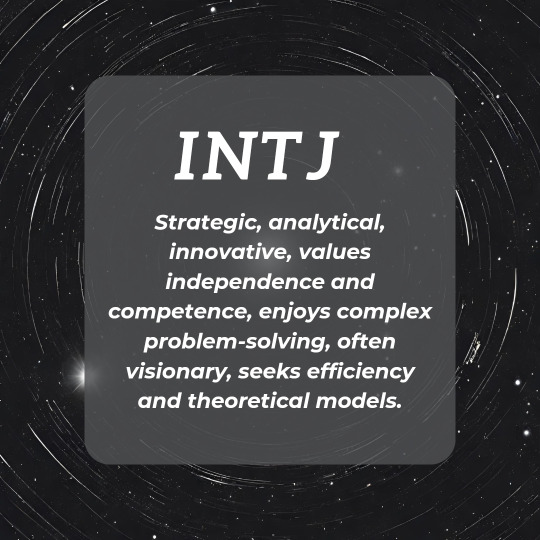
#intj#introvert#intuitive#thinker#intuitive thinker#judger#mbti#personality theory#personality#introverted intuition
86 notes
·
View notes
Text
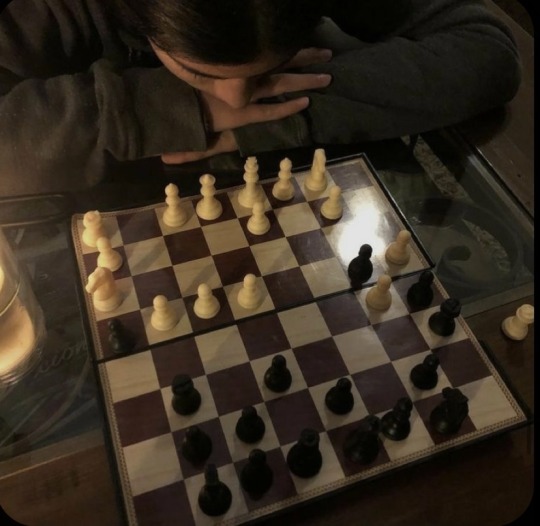



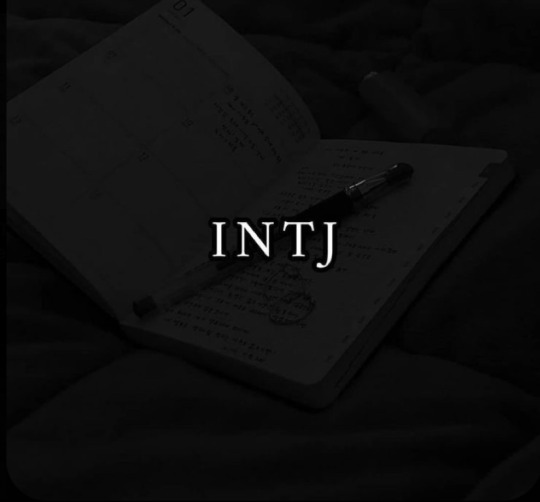


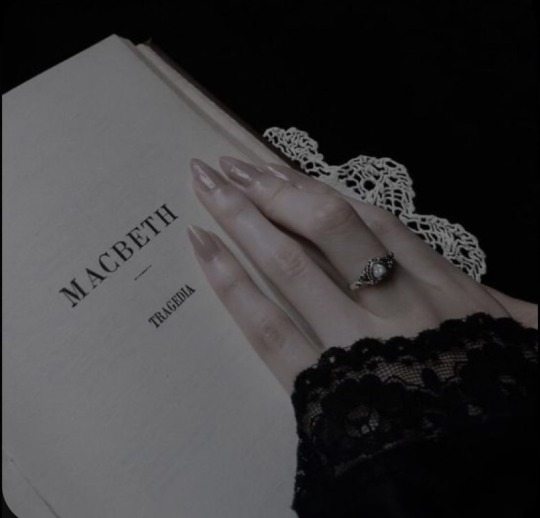

INTJ - The Architect 🖤
#intj#mbti intj#intj female#intj personality#moodboard#aesthetic#aesthetic moodboard#introverted#intuitive#thinking#judging#analysts#the architect#analysts series#mbti series
190 notes
·
View notes
Text
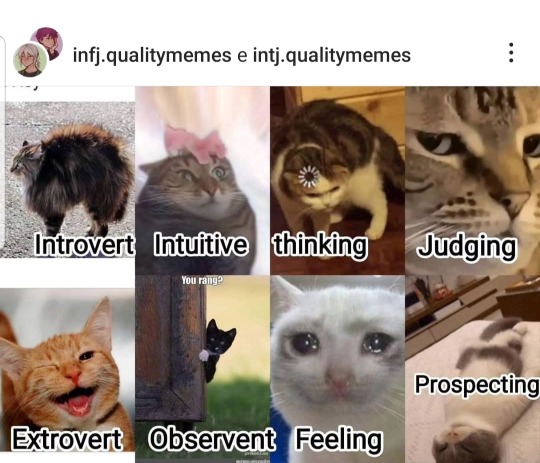
Introvert + intuitive🙆🏾♀️ 😹
Bom dia / Good morning / Guten Morgen😌☕
#infj thoughts#infj personality#infj#infj girl#girl thoughts#funny#intuitive#introvert#mbti#carl jung#mbti types#mbti memes#mbti personality types
152 notes
·
View notes
Text
youtube
Naturally, the intensification of intuition often results in an extraordinary aloofness of the individual from tangible reality; he may even become a complete enigma to his immediate circle.
11 notes
·
View notes
Text

My life's inner work, or shadow work, has continually consisted of doing the work of cleansing the window of my mind, that it may become a mirror reflecting inspiration from the most High.
I do this, not with strenuous effort, but through quiet contemplation, through gently reaching and affirming an inward recognition.
Today I walk in the pathway of inspiration. Said inspiration intuitively guides my creative processing of ideas. I honor my boundaries, personal space and privacy so as to not ever step out of the creative flow of energy I've devoted myself to. There is an inspiration within me which governs every act, every thought, with certainty, with conviction and in peace...
Reflections, Our Journey to Balance
#our journey to balance#reflections#self awareness#conscious living#self love#creative process#creative inspiration#divine guidance#intuitive living#intuitive guidance#personal truth#personal responsibility#personal growth#personal development#personal post#self analysis#lifelonglearning#lifelong study#lifestyle#life path#life learning#life lessons#loner#introvert#self portrait
11 notes
·
View notes
Text



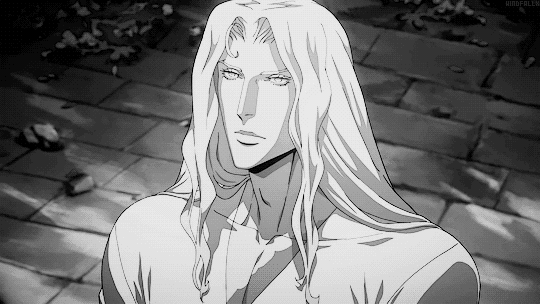

Introverted Intuition or Ni, is characterized by their inclination towards “a-ha” moments and their symbol oriented perception of the world. With an innate talent for seeing meaning everywhere and striving towards their desired future, INxJs are unparalleled when it comes to big picture thinking.
Astrological placements that I associate with the Ni dominants, INTJ & INFJ:
Lilith in 10th, Venus in 10th, Lilith in 6th, Venus in 6th, Pluto in 6th, Saturn in 10th, Saturn in 11th.
<one track mind for success, a fine eye for detail, goal oriented, ambitious, a heavily analytical mind, and a stern and domineering presence amongst their peers.>
Pluto in 5th, Scorpio 4th, Scorpio 5th, Scorpio Juno, Aquarius/Uranus in 8th.
<hatred for small talk, all or nothing attitude towards relationships, a need for depth in their relationships, and finally for aquarius/uranus in 8th, a deep inquisitive mind that they use to break down their interests and hobbies.>
an updated repost. if you don’t have any of these and are an ni dom, i’m in no way discrediting you. these are just placements that give off the energy of ni inherently.
dt: my fellow ni dom, @8emstar8.
#astrology#mixed with#mbti#I’ve grown to enjoy mbti more than astrology as of late#to quote a man who immediately reminded me of ni:#i don’t think#i don’t feel#i know#INTJ#INFJ#Ni#introverted intuition#astro notes#astro observations#lilith in 10th#Venus in 10th#lilith in 6th#Venus in 6th#Saturn in 10th#Saturn in 11th#Pluto in 5th#Scorpio in 4th#Scorpio Juno#Uranus in 8th#Aquarius Uranus#Scorpio 5th#Pluto in 6th
358 notes
·
View notes
Text
INFJ
Introverted at first until I get comfortable with you
#infj personality#infj feelings#infj woman#infj thoughts#mbti types#personality#introvert#infj#love#empathy#intuition#feelings
113 notes
·
View notes
Text

When Shit Happens
MBTI
#mbti#myers briggs#psychology#intj#intuition#intuitive#introvert#extrovert#infj#entj#istp#estp#esfp#enfj#estj#esfj
14 notes
·
View notes
Text

#Me core🎀⭐
#intj#intj female#intj things#intj life#intj thoughts#intj personality#intj aesthetic#intj mbti#mbti intj#mtbi#fyp#lifestyle#life#mental health#aesthetic#books#caffeine#cats#black cat#introverts#i think#introverted#intuitive readings#thinking smart#judging#opinions#life quotes#relatable#art#collage
15 notes
·
View notes
Text
INTP Ti - Si Loop
Explanation on an MBTI loop. Not an expert. May change later.
___
Loops in MBTI occurs when a type begins to cycle between their dominant and tertiary function, completely ignoring the auxiliary and inferior. This is mainly caused from stress and can be continous until finally broken.
___
INTP Function stack: Ti - Ne - Si - Fe
When in a Ti - Si loop, INTP is stuck trying to find answers from previous experiences. They can get trapped in constant rumination about the past as they try to find the answer(s) to their issue(s). However, this does more harm than good as they will start to fixate on their past mistakes. Overanalyzing the things they could and should have done will paralyze them into fear and self doubt. Can be very indecisive. Their overthinking will stump their Aux Ne from functioning properly, which can cause INTP to get trapped with certain routines and structures (even if it is not benefitting them). Without the help of Ne, a looping INTP struggles to form new ideas and perspectives. It makes it difficult for INTP to be innovative.
To escape the loop, an INTP needs to learn to utilize their Ne properly again. They can try to put themselves in new opportunities that will get their Ne to function; new opportunities will hopefully get INTP to explore new ideas and concepts. Brainstorm possible solutions to get their gears going. Learn to be more accepting of their own mistakes and failures, be more self compassionate.
___
MBTI Notes
#mbti#intp#mbti intp#intp personality#ti - si loop#mbti loop#typology#cognitive functions#myers briggs type indicator#myers briggs#intp loop#introverted thinking#extroverted intuition#introverted sensing#extroverted feeling
86 notes
·
View notes